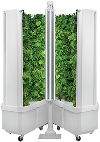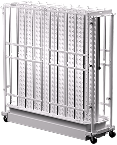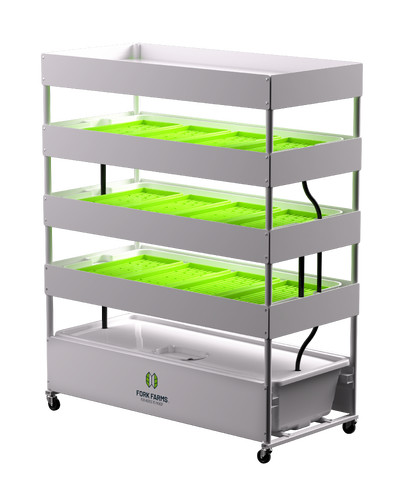How an Indoor Hydroponic Farm Transformed a Dietetic Student’s Life
This blog is from the perspective of Sharice Elbert, who is currently completing one of her dietetic internships at Fork Farms. She graduated with her Bachelor of Science in Nutrition Sciences from Viterbo University in the summer of 2023. She is completing the Master of Science in Community Medical Dietetics program.
An Intern’s Experience with Hydroponics
Cultivating Collaboration Through Research
When the spring semester starts to end, most students’ minds wonder about which friends they will visit and what beaches they will frequent on sunny days. Although I usually do the same thing, I found my mind wandering to a different place. After working with Flex Farm, a hydroponics gardening unit, for a class, I realized my interest in it had grown, just like the produce we had harvested from the hydroponic farm. I knew the Flex Farm could positively impact the entire university. I didn’t want that to be lost when everyone went home for summer break. Little did I know that a simple inquiry would lead to a summer filled with research and collaboration.
Introduction to Hydroponics - A Student’s Experience
Many people experienced firsthand the uncertainty and disruption caused by COVID. Viterbo University in Wisconsin wasn’t exempt from that experience. When staff and students learned the university would close, and classes would transition online, there was a sense of panic. Unfortunately, amidst that chaotic time, our indoor hydroponic garden, the Flex Farm, did not receive the proper shutdown cleaning and care. It resulted in the need for a deep clean and restoration. When the nutrition department staff learned that the hydroponic garden was in a poor state, they tasked the junior dietetics students with restoring the system to see if a successful harvest would still be possible. After working closely with Fork Farms staff to troubleshoot and give the system extra TLC, the students and I were pleasantly surprised when we saw the first group of plants flourishing in the indoor hydroponic garden.
With that being my first introduction to hydroponics gardening and Fork Farms, I was blown away by the potential of the Flex Farm and didn’t want my time with it to end. After inquiring about the future of the Flex Farm with my professor and offering to maintain it over the summer, she recommended conducting research with the system through Viterbo’s Summer Undergraduate Research Fellowship (SURF) opportunity. Although I was hesitant to dive into the unknown research areas, I knew the Flex Farm could extend its benefits beyond the nutrition department to the entire university.
Choosing a Topic
After conversing with my research advisor, Tiffany Lein, and research partner, Samantha Schnick, about various directions we could go with the project, we decided to go in a direction that would benefit the nutrition department and Viterbo students. Although we landed on the idea of looking into the feasibility of growing and selling herbs at the Viterbo cafeteria, we knew that we would need the campus food service director and staff on board for the project to be successful. After communicating with the food service director, Ron McGinley, and chef manager, Havin Rehwinkel, about the research idea, they quickly jumped on board. Once we received approval from the university, we were ready to begin research with the Flex Farm.
Research Procedures
Before deciding which herbs to grow in the system, I spoke with the Chef Manager to inquire about the types of herbs used most frequently, which helped me decide what to grow in the Flex Farm. We purchased seeds and started the planting process. That is when I encountered my first challenge in the research process.
Although pelleted seeds seem to have the best germination success with hydroponic gardening, we did not have chive, parsley, and cilantro pelleted seeds that would arrive in time for planting. The basil seeds used were remaining pelleted seeds from a past bundle purchased, but the chive, cilantro, and parsley seeds were regular seeds purchased from the store, which impacted germination rates. The three herbs grown from regular seeds struggled to sprout in the nursery tray, causing the perceived delayed transplanting period. While that challenge was frustrating, it also taught patience and a sense of understanding for the unpredictability of plants. With time, we transplanted the herbs into the Flex Farm and patiently awaited the harvest.
While waiting for the harvest time, conversations were underway with Ron and Havin about their current purchasing rates for herbs, what they were willing to spend on campus-grown herbs from the Flex Farm, and the future of hydroponics at Viterbo. Before conducting the research, it was apparent that one Flex Farm would not be able to supply all herbs for the cafeteria, but instead supplement what was already purchased, creating a partnership between the nutrition department and the cafeteria. To ensure a successful partnership, it was essential to agree upon selling prices.
Once we harvested the herbs from the system and yields were determined, it was time to calculate the cost of one harvest. Knowing the growing cost per pound for each herb was the last puzzle piece in determining the selling price to present to the food service team. Out of the four herbs (parsley, chives, cilantro, and basil), basil appeared to have the highest selling value and yield and the most profitable and beneficial to grow in the Flex Farm.
|
Herb |
Cost/lb* |
Cost to grow/lb |
Selling price/lb |
Profit per harvest |
|
Basil |
$14.69 |
$7.20 |
$18 |
$68 |
|
Cilantro |
$5.68 |
$13.42 |
$15 |
$4.75 |
|
Parsley |
$5.05 |
$9.36 |
$13 |
$15.65 |
|
Chives |
$2.88 |
$10.59 |
$14 |
$12.95 |
*Product pricing based on spring 2022 distribution company prices
A Lasting Impact
Entering the unknown area of research was daunting and almost caused me to pass on the opportunity of participating in SURF, but the experiences and skills gained during that time are life-lasting. Through support from Fork Farms staff and resources, I expanded my knowledge of hydroponic gardening further than I could have imagined. It left me with a strong interest in providing people access to fresh food grown sustainably. The research topic chosen allowed me to collaborate with fellow peers, professors, food service staff, and Viterbo’s research team, which immensely strengthened my communication skills. Experiencing working with an indoor hydroponic garden has the potential to lead individuals down influential pathways and make a positive impact on the entire community.
If you are interested in this type of program for your college or university contact Fork Farms today!
Important Links:
























